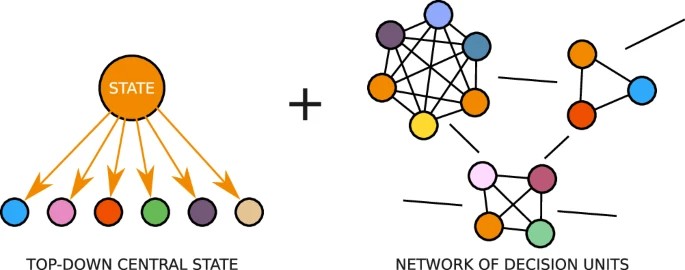What if governance structures worked more like the human body? A groundbreaking study published in npj Complexity suggests this biological approach could help solve one of democracy’s most fundamental challenges—balancing coherent decision-making with representing diverse public opinions.
Researchers from Columbia University and the University of Vermont have developed a mathematical framework that models political decision-making as interconnected networks rather than traditional hierarchical structures, drawing inspiration from how biological systems maintain stability.
“Many existing political systems are inefficient, unstable, or undemocratic,” said Alan Cohen, associate professor at the Butler Columbia Aging Center and principal investigator on the study. “In our simulations, we found that while no single structure is perfect, some governance models are clearly more effective than others.”
The research team modeled decision-making as a “democratic satisfiability problem”—essentially asking how groups can make logically coherent decisions while still respecting popular opinion. Their simulations tested various configurations of decision-making groups, varying in size and degree of overlap between groups.
“In our simulations, we found that while no single structure is perfect, some governance models are clearly more effective than others.”
Surprisingly, the most effective governance emerged when decision-making involved moderate-sized groups with slight overlaps in membership. These structures outperformed both direct democracy (where everyone votes on everything) and centralized authority (where few decide for many).
“Our physiological systems constantly integrate signals and make decisions that maintain equilibrium. We applied a similar logic to political structures,” Cohen explained.
The researchers found this approach particularly valuable when populations are polarized or when individuals hold internally inconsistent views. In one simulation involving a polarized community, having decision groups with small membership overlaps dramatically improved coherence without significantly sacrificing democratic satisfaction.
This networked governance model resembles emerging real-world practices where specialized groups of stakeholders and government representatives tackle specific policy challenges, sharing information across sectors.
The findings suggest that some types of complex decisions—especially those involving technical expertise or interconnected policies—might benefit from more distributed, networked decision processes rather than simple majority voting or executive mandate.
“Our findings highlight the value of decentralized, structured decision-making,” noted Cohen. “The way these groups are organized—and the connections between them—can fundamentally shape the outcomes.”
While this computational model represents an early step, the researchers believe their framework could eventually inform practical improvements to organizational governance in contexts ranging from corporations to government agencies.
“While challenges remain, our research shows that a complex systems and modeling approach to governance offers a powerful lens through which to understand and improve decentralized decision-making,” said Cohen. “This could open the door to more resilient, adaptive political systems in the future.”
The researchers suggest their approach might be particularly valuable for tackling complex societal challenges like climate change, emerging technologies, and public health crises—issues that require both technical expertise and broad stakeholder involvement.
If our reporting has informed or inspired you, please consider making a donation. Every contribution, no matter the size, empowers us to continue delivering accurate, engaging, and trustworthy science and medical news. Independent journalism requires time, effort, and resources—your support ensures we can keep uncovering the stories that matter most to you.
Join us in making knowledge accessible and impactful. Thank you for standing with us!

